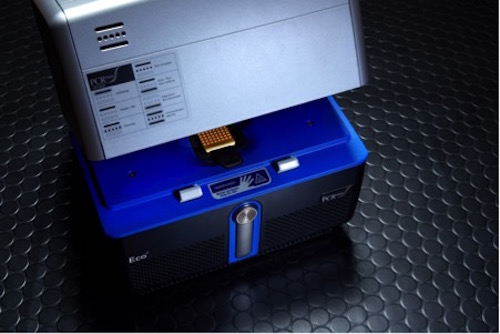PCRmax Eco 48
Uniformity across the block
Andrew Birnie, PCRmax
With its unprecedented throughput, scalability and speed, next-generation sequencing (NGS) enables researchers to study biological systems at a level never before possible. Today's complex genomic research questions demand a depth of information beyond the capacity of traditional DNA sequencing technologies. Next-generation sequencing has filled that gap and become an everyday research tool to address these questions across translational research areas..
However, there is a challenge. One failed or poor NGS run is a huge cost on any laboratory.
In order to make sure that sequencing is cost-efficient, as well as streamlined and accurate, laboratories need to be confident that imprecise, low uniformity qPCR techniques are not ruining their runs. This can have a lot to do with the instrumentation used. A multitude of factors within each PCR system, from temperature control to light bleed-through, can impact on how dependable each run is. By delivering complete uniformity, manufacturers can guarantee that each run is completed reliably and accurate.
Technologies such as the liquid filled block of the Eco 48 are highlighting the benefits of accurate temperature control in techniques such as NGS library quantification.
Improving the performance of NGS technology
Precise DNA amplification is a fundamental pursuit in genomics research. Concomitantly, the development of high throughput NGS technology is often considered one of the most transformative innovations in biological sciences of the past 30 years. Today, this powerful technology has superseded traditional PCR techniques such as capillary and gel based Sanger sequencing as the industry standard.
The NGS process requires the precise preparation and quantification of libraries. If too little template is loaded onto the NGS platform then the run will have low efficiencies. If too much is loaded onto the platform then the run not only risks low efficiency but increased probability of complete failure. Robust and reliable library quantification is therefore critical.
Quantitative PCR (qPCR) is the technique of choice for NGS library quantitation. However, not all PCR systems deliver sufficient thermal uniformity to perform with the high repeatability and accuracy required for NGS systems. With the price of high performance qPCR instruments being outweighed by the cost of a single failed run, employing a robust quantitative qPCR technique is considered one of the simplest and most cost-effective ways to achieve consistent NGS.
This overcomes the imprecision associated with traditional, semi-quantitative end-point detection, including unaccounted variation in PCR efficiency between samples and errors when extrapolating back to the starting quantity.
Temperature control is at the heart of the qPCR process; it dictates whether primers will bind efficiently and whether the polymerase enzymes will work optimally. To achieve high accuracy, a real time PCR thermal system must maintain uniformity across the entire block, ensuring that all samples proceed through the reaction at an equal rate. However, standard qPCR systems only have an accuracy of around ±0.5oC at the 50 to 60oCrange. This is insufficient to precisely define the cluster density, and an NGS run may risk failure if the qPCR platform under or over represents the true library concentration.
Find out mre about the PCRmax Eco 48

